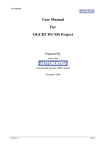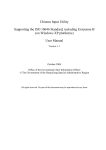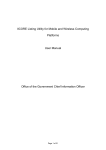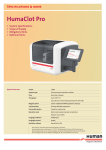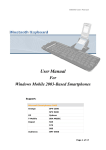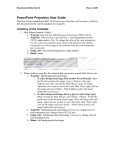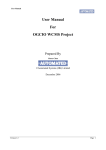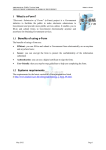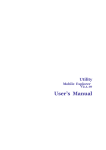Download Supporting the ISO 10646 Standard (IICORE) and Hong Kong
Transcript
Chinese Input Utility Supporting the ISO 10646 Standard (IICORE) and Hong Kong Supplementary Character Set – 2004 (on Mobile Platform) User Manual Version: 1.0 March 2007 Office of the Government Chief Information Officer © The Government of the Hong Kong Special Administrative Region No part of this document may be reproduced in any form. Table of Content 1. 1.1 1.2 2. 2.1 2.2 3. 3.1 3.2 4. 4.1 4.2 4.3 INTRODUCTION .......................................................................................................................................1 BACKGROUND ......................................................................................................................................1 OVERVIEW.............................................................................................................................................1 SYSTEM REQUIREMENTS.....................................................................................................................2 MOBILE DEVICE ...................................................................................................................................2 DESKTOP PC ..........................................................................................................................................2 INSTALLATION ........................................................................................................................................3 INSTALLATION VIA DESKTOP PC ....................................................................................................3 INSTALLATION DIRECTLY ON THE PLATFORM...........................................................................4 USING THE CHINESE INPUT UTILITY...............................................................................................5 INPUTTING CHINESE CHARACTERS................................................................................................5 SWITCHING AMONG CHINESE INPUT METHODS.........................................................................6 INPUTTING ALPHABETS AND SYMBOLS .......................................................................................7 5. UN-INSTALLATION .................................................................................................................................7 6. FAQ ..............................................................................................................................................................9 1. INTRODUCTION Ideographic characters refer to those characters with appearance related to the meaning of the characters, such as the Chinese characters. In November 2005, ISO released the ISO/IEC 10646:2003/Amd 1:2005. This release publishes a subset of ideographic characters, named as International Ideographs Core (IICORE)1. The formulation of a subset of these ideographs can provide conveniences for day-to-day electronic communication in Chinese on resource-limited devices, for example mobile devices. In addition, this subset can also facilitate global electronic communications in Chinese by providing a shared subset of ideographs. Further information about the IICORE is available at http://www.ogcio.gov.hk/ccli/eng/structure/iicore.html . 1.1 BACKGROUND As Chinese is the language used by most people in Hong Kong, the development of a common electronic interface for users who prefer to use Chinese in electronic communication is very important. Under the Digital 21 IT Strategy, the Government has developed an open and common Chinese language interface for the Hong Kong Special Administrative Region. A pivotal element of the open and common Chinese language interface is the adoption of the ISO 10646 coding standard, which is an international standard developed by the International Organization for Standardization (ISO) for the handling of characters in electronic data storage and exchange. The ISO 10646 standard embraces characters used in major languages in the world including traditional and simplified Chinese characters. The Government has been actively participating in the development of the ISO 10646 standard. 1.2 OVERVIEW This user manual provides installation instructions and other details about the Chinese Input Utility (the Utility), which supports the ISO 10646 standard (IICORE) on mobile platform. The Utility supports the International Ideographs Core (IICORE) and the Hong Kong Supplementary Character Set-2004 (HKSCS-2004)2. The Utility can be used to input characters into Unicode-compliant applications3 on mobile platform. The Utility contains the following components: 1 2 3 The IICORE contains 9,810 characters. The HKSCS-2004 contains 4,941 Chinese characters that are specific to the Hong Kong environment and that are used by the public and the Government in electronic communication and data exchange conducted in Chinese. For further details, please visit: http://www.ogcio.gov.hk/ccli/eng/hkscs/introduction.html. In 1991, the International Organization for Standardization and the Unicode Consortium agreed to synchronize the ISO 10646 standard and Unicode. Therefore, products supporting Unicode also support the ISO 10646 standard. 1 Major components Unicode Font, “Ming(for ISO10646)” (HKSCSIIC.TTF) Chinese Input Utility (IICoreIM.DLL) Description A font supporting IICORE and HKSCS-2004 standard for display. A program that can be used to input characters into Unicode-compliant applications on the Platform. Input Method Mapping Tables Input method mapping tables for Changjei(倉 (Chajei.tbl, Quick.tbl, Stroke.tbl) 頡) code, Quick(簡易)code, and Number of stroke(筆劃數目). Installation Program on Mobile The installation program of the Utility Platform running on the Platform. (IICoreIM.CAB) Installation Program run and The installation program running on a desktop installed from a desktop PC PC to which the Platform is connected. (IICoreIM.EXE) 2. 2.1 SYSTEM REQUIREMENTS MOBILE DEVICE - Chinese version of Microsoft Windows Mobile 5.0 (the Platform) installed; 5MB space; and Unicode-compliant applications on the Platform. Note: Due to variation of the hardware device specification, the Utility may not be 100% compatible with all similar devices 4. 2.2 DESKTOP PC Via desktop PC, users can easily transfer and then install the Utility on the Platform. - Data connection software (such as Microsoft ActiveSync) installed; Data connection, such as USB cable, to the Platform; and 10MB hard disk space. Note: the hardware requirement of the desktop PC and the operation of the data connection, please refer to the reference manual or the website of the mobile device. 4 Th e U t i l i t y w a s d e mo n s t r a t e d o n 2 mo b i l e d e v ic e s ( “ O 2 X d a A t o m E x e c ” a n d “Dopod 818 Pro” ) 2 3. INSTALLATION Before you start installation, please make sure again that your mobile device has met the system’s requirements as specified in Chapter 2 of this user manual. Please backup your data before installation. There are 2 ways to install the Utility: via desktop PC or direct installation on the Platform. They are described at the sections 3.1 and 3.2 respectively. 3.1 INSTALLATION VIA DESKTOP PC Via desktop PC, users can easily transfer the installation program to the Platform, where Utility will be installed. On desktop PC Step 1: Please download the “IICoreIM.EXE” to your desktop PC by following the instructions in the webpage: http://www.ogcio.gov.hk/ccli/eng/hkscs/download.html. Step 2: Connect the Platform to the desktop PC according to the reference manual of your Platform. Step 3: Double click the “IICoreIM.EXE”, then you will see Figure 1. Click “OK”(確 定 ) button and then follow the instructions on screen to start installation. Figure 1 Step 4: When Figure 2 is shown, the installation program is being delivered to the Platform. Figure 2 3 Step 5: When Figure 3 is shown, click “OK” (確 定 ) button to complete the installation on the desktop PC. Proceed to Step 6 below to be done on the Platform. Figure 3 On mobile device Step 6: On the Platform, tap the “Yes”( 是 ) button and follow the instructions on screen. If external memory storage is attached to the mobile device, please select device (裝 置 ) to install the Utility to the mobile device. Figure 4 Step 7 Unplug the USB cable (if applicable) and tap “ok” button to reboot(重 新 啟 動 ) the Platform to complete installation. Figure 5 3.2 INSTALLATION DIRECTLY ON THE PLATFORM Users can install the Utility on the Platform directly. Step 1: Please download the “IICoreIM.CAB” to any desktop PC by following the instructions in the webpage: http://www.ogcio.gov.hk/ccli/eng/hkscs/download.html Notes: Please pay attention to the cost, if applicable, and the amount of time of downloading the “IICoreIM.CAB” (4M bytes) through mobile phone network. Step 2: Copy the “IICoreIM.CAB” to a storage media readable by the Platform. Step 3: Tap the “IICoreIM.CAB” under the file explorer of the Platform. 4 Step 4: Follow Step 6 in section 3.1 above. 4. 4.1 USING THE CHINESE INPUT UTILITY INPUTTING CHINESE CHARACTERS Step 1: On the Platform, launch a Unicode-compliant application (the Application), such as Mobile Word, and select the “IICore IM”. Step 2: Default Changjei input method will be displayed. On the keyboard-like interface, tap the input code(s) of the Changjei code(s) of a Chinese character and the “Space” key to input the Chinese character; tap “Backspace” to delete the input code just keyed; or tap the “Esc” key to cancel all the input codes. Step 3: If only one Chinese character corresponds to the input code(s), then the Chinese character will be automatically inputted. In Changjei input method, tap “日 ”, “日 ”, “日 ” and “Space” keys, then the character “晶 ” will be automatically inputted into the Application. Otherwise, candidate characters will be listed in the gray selection area, where you can directly tap the candidate character to input; or tap「 P↑」(Page Up) or 「 P↓」(Page Down) keys to navigate to previous and next page respectively. 5 Tap「 速 」 , tap “日 ”, “月 ” and “Space” keys, then candidate characters(e.g. “ 明 晞 晴 ... “) will be shown in the gray selection area. You can tap the candidate character to input it to the Application. In Number of Stroke input method, tap “ 5” and “ Space” keys, then candidate characters(e.g. “ 且 丕 世 ... “ ) will be shown in the gray selection area. You can tap the candidate character to input it to the Application. 4.2 SWITCHING AMONG CHINESE INPUT METHODS Step 1: If the Utility is not yet activated, please follow Step 1 of section 4.1 to activate it. Step 2: The Utility provides Changjei, Quick and Stroke Count input methods. Directly tap the 「 倉 」, 「 速 」or「 筆 」icons to select the desired input method. Step 3: Tap the application software where the characters to be inputted, and then start to input Chinese characters. 6 4.3 INPUTTING ALPHABETS AND SYMBOLS Step 1: If the Utility is not yet activated, please follow Step 1 of the section 4.1 to activate it. Step 2: Tap the「 英 」(English alphabet) or 「 符 」(Symbol) icons to select them accordingly. Tap the 「 全 」 icon for Full Width Form. 5. UN-INSTALLATION Caution: After un-installation of the Utility, the Chinese font, Ming(for ISO10646), will also be removed. For proper display of IICORE and HKSCS characters in programs or documents, you may need to install Chinese fonts supporting these standards, and configure the programs/documents accordingly. Please follow the steps below to remove the Utility. On desktop PC Step 1: (If the Utility has been installed directly on the Platform. “IICoreIM” will not be found on the desktop PC. Please proceed to Step 3 to be done on the Platform) On desktop PC, click "Start"(開 始 ) >> "Control Panel"(控 制 台 ) >> "Add or Remove Program"( 新 增 或 移 除 程 式 ), and locate the “IICoreIM” and then click the “Remove” ( 移 除 ) button. 7 Step 2: Click “Yes”(是 ) to confirm to remove the program. On mobile device Step 3: Tap"Start"( 開 始 ) >> "Setting"( 設 定 ) >> "System"( 系 統 )>>"Remove Program"( 移 除 程 式 ), and locate the “IME IICoreIM” program, and then tap the “Remove” (移 除 ) button. Tap the last “ok” button to reboot the mobile device to complete the un-installation. 8 6. FAQ 1. Which applications can the Utility support? The Utility has been demonstrated on the applications such as web browsers (Internet Explorer, Minimo and Opera ) and RSS reader (PocketFeed and PocketRSS). 2. What input methods are provided by this Utility? This Utility provides Changjei, Quick and Stroke Count input method to input Chinese characters to Unicode compliant application software. 3. What is IICORE? The IICORE contains 9,810 characters. It can be implemented in devices with limited memory, input/output capability. For further details, please visit: http://www.ogcio.gov.hk/ccli/eng/structure/iicore.html. 9











